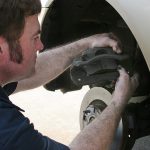Concerned that your Jeep transmission is nearing the end of its life? Or that something is about to go wrong?
Jeeps have an almost legendary history and remain popular even with the most affluent Americans. But regardless of how much money you have, you never want your pride and joy to be damaged. It’s a matter of convenience if nothing else.
Whether you’re driving an automatic or stick shift, your gearbox needs to be in fully working order. Otherwise, you could find yourself stuck in the middle of nowhere without a roadworthy vehicle. Or without the power you need to get to your destination.
Knowing the warning signs of a faulty Jeep transmission can save you a long wait at the side of the road. Keep an eye (and an ear) out for the following things.
Find Your Online Car Repair Manual Today! ->>
1. Transmission Slipping
When you’re driving along, is your automatic transmission shifting between gears for no good reason? Does the box skip up gears far too quickly, or down in inappropriate circumstances?
You might end up underpowered on a hill, or on a large highway while accelerating. Or you might hear your engine whine or groan as the gearbox skips up and down. This is putting unnecessary strain on your engine.
You probably need to recalibrate your transmission or have an engineer do it for you.
2. Problems Shifting Gear
You might notice that there’s a gap between moving from ‘park’ to ‘drive’ and your engine actually engaging, even though you’re pressing the gas pedal.
This is a symptom of delayed engagement – your transmission is not engaging the first gear when you shift to drive.
Engagement problems are more noticeable if you drive stick, as you may struggle to actually get the stick into the next gear. Or you might have issues pushing the clutch all the way down to de-engage the current gear.
The latter of these might actually be a problem with your clutch pedal, which you should definitely get fixed.
3. You Notice a Burning Smell
Any time you notice an unpleasant burning smell, you must get your Jeep checked out.
This can be caused by several different problems, one of which is that your transmission fluid may be getting too hot. You’ll notice that the smell is incredibly pungent and unpleasant.
This might be because there isn’t enough fluid, or that it has sludge building up in it due to damage. Which in turn leads to higher friction within the transmission system.
The increased corrosion and wear caused by a lack of fluid, or the wrong kind of fluid, can cause serious damage to your gearbox. This can directly lead to a breakdown.
You should use a premium transmission fluid in your Jeep to ensure longevity. And it must be the right type for your vehicle – the manufacturer’s book should give you this information.
4. Warning Lights Turn On
Never ignore your warning lights – they’re not there for decoration!
If you’re lucky, when you have your vehicle checked it’ll turn out that it’s the warning light, and not your Jeep transmission, which is faulty. It happens.
But it’s never worth the risk of ignoring the light. If there is a problem, it’ll only get worse over time. And it’ll be more expensive to fix than if you’d had the problem checked to start with.
Some warning lights exist purely to remind you that it’s time for a service. You’d do well to heed these too. Regular servicing can extend the lifetime of many vehicle components. It can also help to catch problems early – and resolve them before they hit your wallet too hard.
5. Crunching, Grinding, or a Stiff Transmission
If your Jeep transmission has a problem, you may hear grinding or ‘crunching’ noises as you shift from park to drive. Or while you’re driving as the car automatically shifts gear.
This might not slow down the gear changes, but it can be pretty noisy. On the other hand, you may also feel that the car is straining slightly during this process. And there may be a delay in the gas kicking back in after the change.
For those of you who drive stick, you’ll know how your transmission should feel when shifting gears. You’ll become familiar with this feeling over time.
If it feels different one day, you might have a problem with your transmission.
Even with the clutch pushed all the way down, you might have trouble wrenching the stick for a gear change.
6. Visible Leaks Under Your Car
If there’s a wet patch underneath your car after you park it, you might have a leak.
It might not be your transmission – it could be oil or water, depending on the damaged system.
But whatever it is, you’ll need to get it fixed. If it’s your Jeep transmission leaking fluid, the lack of fluid can cause severe corrosion, as we’ve explained above.
The good news is that leaks are often relatively affordable to repair – perhaps a couple of hundred dollars. We know that’s not incredibly cheap, but it’s definitely much cheaper than repairing serious faults with the transmission.
My Jeep Transmission Needs to be Repaired
If you think your Jeep transmission, or any other part of the car, needs repairwork, don’t delay. As we’ve mentioned, auto repairs only get more expensive the longer you leave a problem unfixed.
Use our site to help you find a suitable mechanic to talk with about your Jeep. They’ll help you to get to the root of the problem and suggest sensible answers on how to deal with it.
If you’re looking to repair the problem yourself, check out our blog for the latest tips on auto repair. We hope your Jeep is restored to working order very soon.







